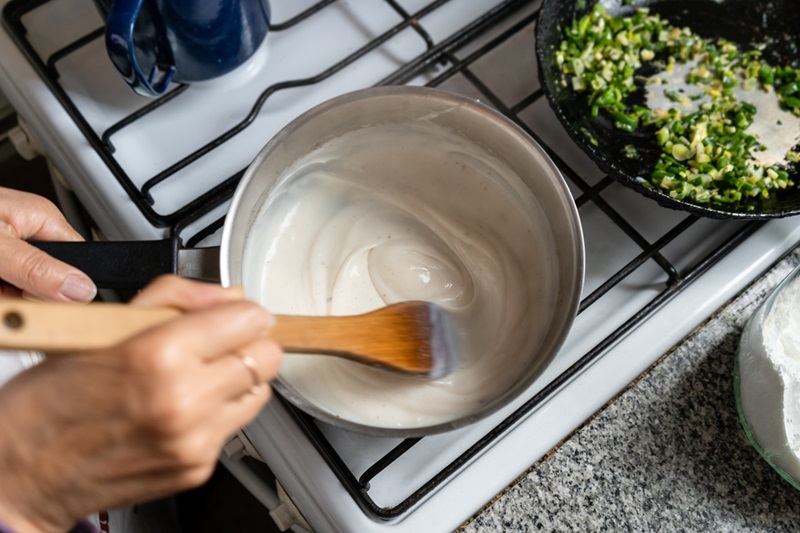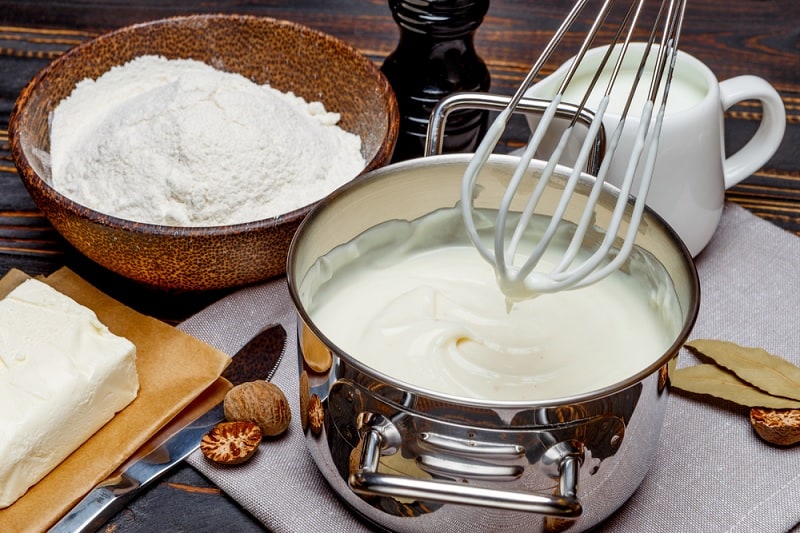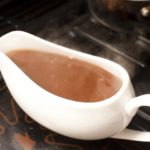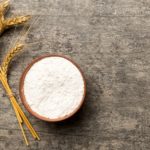White sauce, also known as béchamel sauce, is a simple sauce that can have a number of other ingredients added to make it work with virtually any dish.
Add some cheese for a great macaroni cheese dish, or throw in some herbs and spices to provide the perfect accompaniment to an otherwise bland meat, such as chicken.
You can make white sauce with self-raising flour… although it is not advised.
Self-raising flour contains ingredients that add some taste and potential texture to a dish, which can prove problematic when you’re making things like sauces.
What Will Happen if I Use Self-Raising Flour to Make White Sauce?
If you are making a white sauce that has extra ingredients added to it to alter the taste, such as cheese or spices, then very little will happen if you use self-raising flour instead of plain flour.
If you are making a plain white (béchamel) sauce without those added flavours, however, you will find that the taste will be altered by the substitution of self-raising flour for plain flour.
Extra ingredients in the self-raising flour such as baking powder, salt, etc., will transfer from the flour itself to the sauce. Your white sauce could then taste a lot saltier than it should do, or it’ll have a slightly ‘off’ taste.
Self-raising flour and plain flour are not interchangeable for most recipes. You can often use plain flour in place of self-raising flour if you add baking powder, but you cannot extract the baking powder and salt from self-raising flour to turn it into a plain enough flavoured powder for sauces and similar.
What Type of Flour Are You Supposed to Use for White Sauce?
Most white sauce recipes call for plain flour, also known as all-purpose flour in the United States.
When mixed with milk and butter, the result is a thick but smooth sauce that works well in a lasagne, in other pasta dishes, and many others.
You can also use corn flour and a number of other flour types or substitutes. Self-raising flour, however, is not a good substitution for plain (or all-purpose) flour in white sauce.
Plain Flour Substitutes for White Sauce
You actually have quite a few options when it comes to finding a plain flour substitution to make a white sauce:
- Self-raising flour – You will need to change the sauce up so that it is a cheese sauce, or flavoured with other things, and not just white (Béchamel) sauce.
- Chickpea flour – This can help make your white sauce gluten-free, but it will also add a slightly nutty flavour.
- Rice flour – Another potential gluten-free option. Your white sauce will have a delightfully velvety texture and finish.
- Almond flour – Your white sauce will have a nuttier finish (as expected), and it will also have a slightly darker colour, more light brown than white.
- Buckwheat flour – Your white sauce will be slightly thicker with buckwheat flour.

How to Make White Sauce
If you’re attempting to make white sauce for the first time, you may find the process a little tricky, but this is only because you are new at it.
Once you’ve made the sauce once, you’ll have a better idea of the process, and the second and subsequent times will be a lot easier.
The thing that makes white sauce a little different from other sauces is that you first must start with a paste-like consistency, before adding the milk to turn the paste into a thick liquid.
The paste, made from flour and butter, is known, in French, as roux, pronounced ‘roo’.
The paste is made with continuous stirring of roughly equal amounts of butter and flour.
Once the paste or roux has formed, milk and other ingredients are then adding, over heat, whilst stirring continuously once again.

Kim is a writer with more than a decade of experience, and a food enthusiast. When she’s not spending her time writing about her favourite dishes, you can find her in the cake aisle of her local supermarket, or making a mess in the kitchen.





